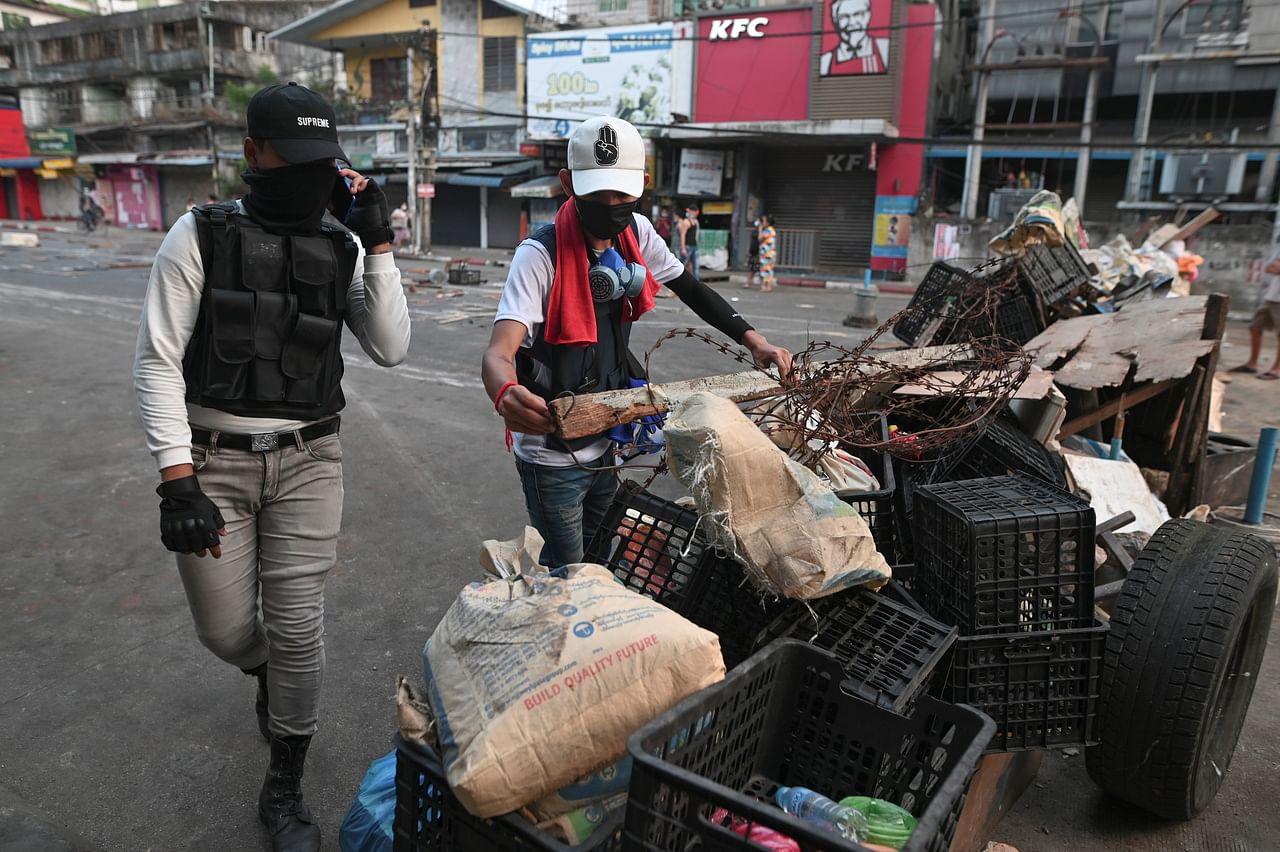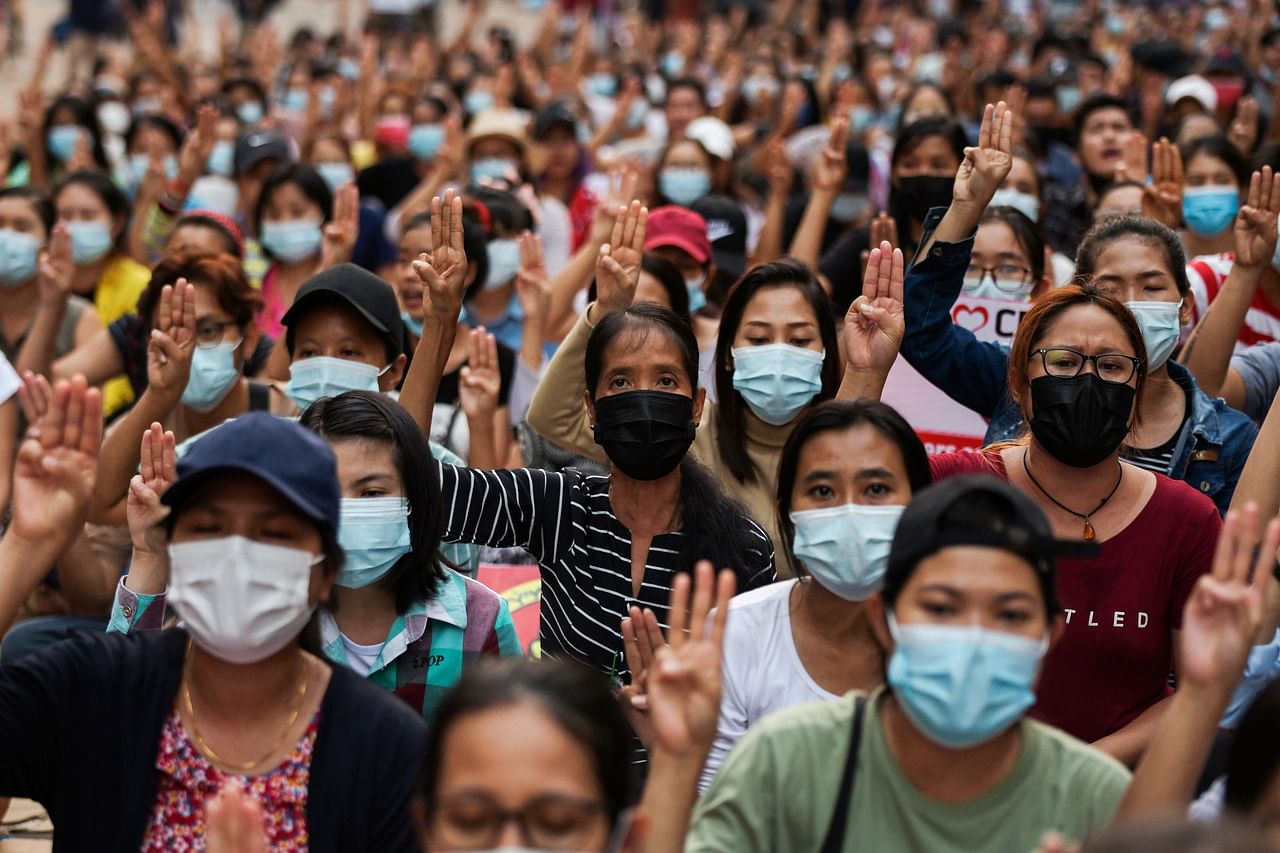Myanmar imposes martial law as security forces fire on protesters, leaving 6 dead
Sign up now: Get insights on Asia's fast-moving developments
YANGON (BLOOMBERG, REUTERS) - Myanmar's junta on Monday (March 15) extended "full martial law" to additional areas in Yangon following a weekend of nationwide protests that left at least 50 people dead in the wake of a brutal crackdown by security forces.
Coup leaders first imposed the measure in two townships late Sunday after the Chinese Embassy asked authorities to guarantee the safety of Chinese investments and citizens they said were attacked earlier in the day, leaving an undisclosed number of injuries. The orders were later expanded to four more townships in Yangon.
State broadcaster MRTV announced that more than 2,000 protesters blocked roads over the weekend to prevent firefighters from putting out fires at several factories in industrial zones, which included Chinese businesses.
The Global Times, a tabloid run by the Communist Party, reported that 32 China-funded factories had been vandalized in attacks Sunday with the property damage reaching $36.89 million (S$50 million). It said earlier that two China-funded garment factories were destroyed in arson attacks.
The martial law order includes the location where the factories are located and other townships where violent protests were occurring.
It gives the head of the military's local command power "to ensure safety, the rule of law and peace more effectively," by trying offenders in a military court where they could face much more severe penalties, including death.
Myanmar security forces fired on pro-democracy demonstrators on Monday, killing six people, media and witnesses said.
Supporters of detained democratic leader Aung San Suu Kyi marched again, including in the second city of Mandalay and in the central towns of Myingyan and Aunglan, where police opened fire, witnesses and media reported.
"One girl got shot in the head and a boy got shot in the face," an 18-year-old protester in Myingyan told Reuters by telephone. "I'm now hiding."
The Myanmar Now media outlet reported three people were killed in Myingyan and two in Aunglan, while a journalist in Mandalay said one person was shot dead there after a big protest had passed off peacefully.
The protesters took to the streets in defiance of the authorities' escalating use of violence, with dozens killed on Sunday in the bloodiest day since the Feb 1 coup.
The arson attacks on Sunday provoked China's strongest comments yet on the turmoil gripping its South-east Asian neighbour, where many people see China as supportive of the coup.
China's Global Times newspaper said 32 Chinese-invested factories were "vandalised in vicious attacks" that caused damage worth US$37 million (S$50 million) and injuries to two Chinese employees, while its embassy urged Myanmar's generals to stop the violence.
"We wish that Myanmar's authorities can take further relevant and effective measures to guarantee the security of the lives and assets of Chinese companies and personnel," foreign ministry spokesman, Zhao Lijian, said in Beijing.
Japan, which has long competed for influence in Myanmar with China, said it was monitoring the situation and considering how to respond in terms of economic cooperation.
The burning and looting of Chinese companies is abhorrent, Chinese Foreign Ministry spokesman Zhao Lijian said Monday at a regular press briefing.
"We hope the Myanmar side will take concrete measures to protect the safety of Chinese citizens in Myanmar."
The worst of Sunday's bloodshed came in the Yangon suburb of Hlaingthaya where security forces killed at least 37 protesters after arson attacks on Chinese-owned factories, said a doctor in the area who declined to be identified.
Sixteen people were killed in other places, rights group Assistance Association for Political Prisoners (AAPP) said, as well as one policeman.
The latest deaths bring the toll from the protests to about 140, based on a tally by the AAPP and the latest reports.
A junta spokesman did not answer calls requesting comment.
In an apparent bid to suppress news of the turmoil, telecoms service providers were ordered to block all mobile data nationwide, two sources with knowledge of the matter said.
Telecom Telenor said in a statement "mobile internet was unavailable".
The army said it took power after its accusations of fraud in a Nov 8 election won by Ms Suu Kyi's party were rejected by the electoral commission. It has promised to hold a new election, but has not set a date.

People take part in an anti-coup night protest at Hledan junction in Yangon, on March 14, 2021.
PHOTO: X80002

People run past makeshift barricades set up by protesters in Hlaing Tharyar township in Yangon, on March 14, 2021. \
PHOTO: AFP
Court session postponed
Ms Suu Kyi has been detained since the coup and faces various charges, including the illegal importing of walkie-talkie radios and infringing coronavirus protocols. Last week, a charge related to accepting illegal payments was added to the list.
She was due to face another virtual court hearing on Monday but her lawyer Khin Maung Zaw said the session could not go ahead because the internet was down which meant no video conferencing. The next hearing will be on March 24, he said.
Khin Maung Zaw also said authorities had informed him the detained Nobel laureate would only be permitted to be represented by two junior lawyers.
Western countries have called for Ms Suu Kyi's release and condemned the violence and Asian neighbours have offered to help resolve the crisis but Myanmar has a long record of rejecting outside intervention.
Mr Tom Andrews, the United Nations human rights investigator on Myanmar, appealed for UN member states to cut the supply of cash and weapons to the military.
"Heartbroken/outraged at news of the largest number of protesters murdered by Myanmar security forces in a single day. Junta leaders don't belong in power, they belong behind bars," he said on Twitter.
Myanmar's oldest ethnic minority insurgent group, the Karen National Union, which signed a ceasefire with the army in 2012 after decades of fighting, also condemned Sunday's violence and said it fully supported the demonstrators.
Anti-Chinese sentiment has risen since the coup, with opponents of the army takeover noting Beijing's muted criticism compared with Western condemnation.
Protest leader Thinzar Shunlei Yi said Myanmar people did not hate their Chinese neighbours but China's rulers had to understand the outrage felt in Myanmar over their stand.
"Chinese government must stop supporting coup council if they actually care about Sino-Myanmar relations and to protect their businesses," she said on Twitter.

People flash a three-finger salute as they take part in an anti-coup night protest at Hledan junction in Yangon, on March 14, 2021.
PHOTO: X80002
The imposition of martial law comes amid signs that the violence could escalate further.
Committee Representing Pyidaungsu Hluttaw (CRPH), a parallel government set up by ousted members of the Parliament elected in November's national poll, on Sunday announced that protesters have the right to defend themselves if attacked by a military they now call a "terrorist group."
"In effect, the people have experienced a brutal martial law since the coup," said Matthew Smith, chief executive of Fortify Rights, a human rights group.
"The formal imposition of martial law is immaterial in some ways, except for the fact that the junta regards it as stepped-up security presence. For that reason, it's a grave development."
The Special Advisory Council for Myanmar, a group of international experts consisting of former UN officials, has meanwhile warned that "a major military crackdown may be imminent, with fatal consequences" and called for "immediate international political intervention."
"So far, the international response to the attempted coup has been weak," the council said. "It is sending a dangerous message that the generals will continue to suffer no meaningful repercussions for their violent attacks on the Myanmar people."
While the UN Security Council has condemned the violence, countries including China and Russia have opposed stronger language and sanctions against the Myanmar military leaders. China has said it maintains good relations with all parties in Myanmar and called for dialog to prevent the situation from deteriorating.
At the same time, South Korea on Friday became the first Asian country to take meaningful action against Myanmar, suspending new defense exchanges and cooperation, cutting the export of military supplies and putting development assistance under review.
The junta's lead spokesman, Zaw Min Tun, reiterated Thursday that minimal force was used to disperse protesters, even as witnesses say live bullets continued to be utilised.
He said security forces will continue to enter some properties to search for protest instigators in some townships, which he added was "to ensure safety and the rule of law."
In Mandalay on Saturday, demonstrators took to the streets after deadly violence earlier in the day.
Tens of thousands of engineers and engineering students chanted for an end to military dictatorship and the release of detained leaders including Aung San Suu Kyi, the deposed elected leader.
"Security forces are trying to scare us from joining street protests in the coming days," said Aung Myo Nyunt, a 20-year-old student protester in Mandalay. "Their efforts will be in vain."
Soldiers and riot police have forced striking public servants and employees in certain sectors to return to work as the civil disobedience movement threatens a collapse in services including banking, health care, education and transportation.
The junta asked all banks to reopen on Monday, and said actions would be taken if lenders fail to obey.


